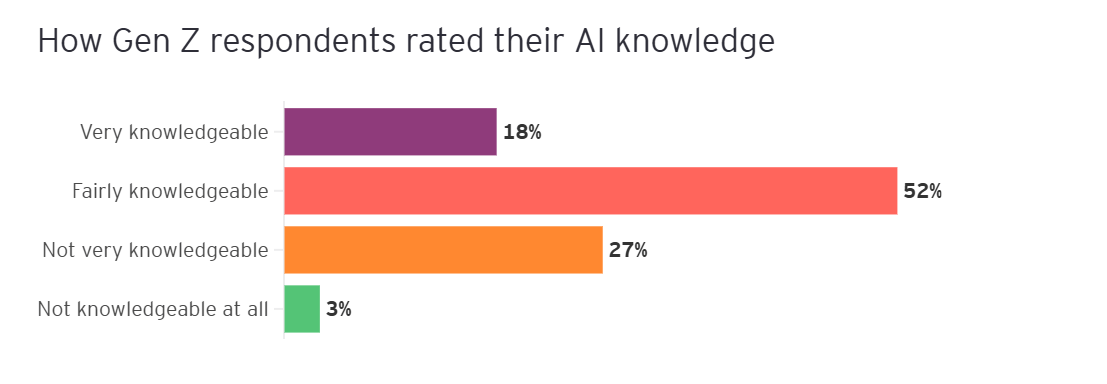A new global survey assesses Gen Z’s understanding of AI, suggesting education and training are not hitting the mark.
In brief
- Gen Z will have long-term exposure to the impacts of AI in the workplace but has not yet gained sufficient AI literacy to fully harness its potential.
- Even those who rated themselves as “very knowledgeable” scored poorly when it came to writing prompts for or evaluating shortfalls with AI technology.
- Educators, businesses and policymakers must work collaboratively to define what AI literacy training should look like – and who needs it.
The rise of artificial intelligence (AI) – and particularly generative AI (GenAI) – has left educators and businesses scrambling to ensure AI literacy among the generation that will likely be most impacted by this technology given their life stage: Gen Z.
Born roughly between 1997 and 2007, Gen Z is the current generation rapidly entering the workforce as the youngest wrap up high school and oldest reach their late 20s. This life stage implies that Gen Z will have the longest work-life duration with this emerging technology, and it certainly will impact and shape how they live, work and play for decades to come. While the excitement and curiosity surrounding this generation may point to limitless opportunity, Gen Z may also be particularly exposed to the challenges and risks posed by the technology’s capabilities. There is broad positivity around the expected effects of GenAI on productivity and helping give employees more opportunity to better focus on higher value work, according to the EY 2024 Work Reimagined Survey.
The time of questioning whether AI brings value has gone away.
Dr Sooyeon Kim, AI Lead, EY Korea
Many Gen Z individuals are still in the throes of obtaining formal education and training, which should ideally prepare them for their future working lives. But is their introduction to GenAI in the educational setting properly preparing them for an AI-powered workforce of tomorrow? What new pathways need to be established to enable career progression?
This global survey, How can we upskill Gen Z as fast as we train AI?, by EY teams and TeachAI, with support from Microsoft, extends what we know about how Gen Z understands, uses and critically assesses AI. The research not only canvasses Gen Z’s usage and perceptions of AI, but also tests their AI skills and knowledge.
Topline Findings
The survey found that Gen Z’s ability to understand and use AI is reasonable, but their ability to critique it is less developed.
Specifically, Gen Z:
- Do best when it comes to understanding AI, such as selecting what tasks and products commonly use AI.
- Is less sure about questions involving using AI, such as writing the best prompts for AI to give the best answers.
- Is least confident when it comes to evaluating and identifying critical shortfalls with AI, such as whether AI systems can make up facts.
The survey canvassed 5,218 respondents drawn evenly from 16 countries across five regions: Middle East, Africa and India (MEAI); Asia-Pacific; Europe; Latin America; and North America. The age of respondents ranged from 17-27 years old at the time of the survey, segmented to do justice to age-based differences within Gen Z.
The survey was complemented by extensive desk research and interviews with AI experts both pre- and post-survey to inform the survey design and add interpretational and analytical layers to the results.
Difference Between Self-Reported and Actual Knowledge
When asked to self-assess their knowledge of AI, respondents offered a range of answers, with three in 10 saying they were not very knowledgeable or not knowledgeable at all.

However, when the survey tested their level of actual knowledge, it was fairly consistent across the board, even for those who felt they weren’t knowledgeable. This suggests we should not rely on Gen Z’s perceptions regarding its level of AI literacy given that many Gen Z respondents proved to be more knowledgeable than they realized.
Difference Between Use in Work and Education
Another finding emerged around which settings (work or education) Gen Z expected to be encouraged to use AI. While only 7% of respondents expected to be discouraged from using AI in the workplace, this rose to 21% in an education setting.

This raises several questions. Are we teaching the right type of approach to AI in educational institutions? Are businesses encouraging AI adoption without appropriate guardrails? How do we bring these two contexts into better alignment to ensure a more consistent set of expectations regarding AI use?
“The time of questioning whether AI brings value has gone away. Regardless of size, every enterprise is thinking about their AI adoption … with that more and more enterprises are recognizing it’s important to train their employees in how to use these tools and provide good use cases,” says Dr Sooyeon Kim, AI Lead, EY Korea.
The Road Ahead for Gen Z and AI
We are at a crossroads when it comes to Gen Z and AI. Down one path is a future where Gen Z has been empowered with appropriate AI literacy and the opportunity to participate in all the benefits that AI offers, to create a path to prosperity.
This will require greater guidance from policy makers about what AI literacy training should look like, so both educators and business can make more informed decisions about AI literacy training.
Educators and businesses should also be mindful that Gen Z is not always a good judge of its actual AI knowledge. Where appropriate, educators and businesses should partner to design and deliver optimal AI literacy training to build the workforce of the future.
Summary
As the youngest generation infiltrating the workforce, Gen Z will be most exposed to the challenges and opportunities presented by AI throughout their careers. But despite being “digital natives,” this cohort may be overconfident about its ability to use and evaluate AI tools. Policymakers, educators and businesses need to build consensus around how to rapidly increase the AI literacy of the future workforce.

 5.0
5.0 





















